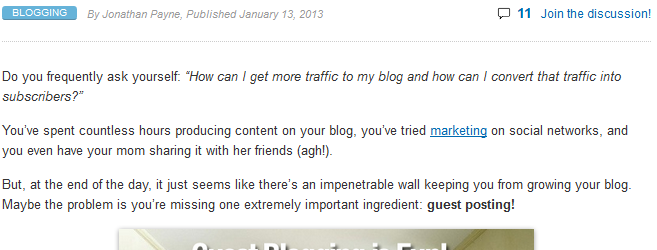 The world works in strange ways, huh?
The world works in strange ways, huh?
As some of you may know, I recently started working as an Interactive Marketing Specialist at Strategexe Consulting Group, a digital marketing agency in Louisville. One of the first things I suggested was to start allowing guest posts on the Strategexe blog.
So, I took on the task of creating a set of guest posting guidelines, “recruiting” guest bloggers, and handling guest post submissions. This was back in March.
Fast forward about three months and I wake up to a guest post submission for Strategexe. Here’s where things get fun.
A Story of Coincidence!
The guest post submission was from a company/website called Guest Posting Services. Pretty self-explanatory name, but here’s how they explain their process:
The concept of guest posting is pretty straightforward; we identify the target niche of our client’s website(s) and our team of expert content creators diligently crafts highly researched articles on currently trending topics that are readily accepted by the top-notch websites.
Our team of online marketers then contacts the webmasters or editors of those reputed blogs and websites to seek permission to post those articles, and in lieu of the same, we seek just a back-link in the author-bio section, which turns out to be highly powerful since there are no other out-going links from that web page.
I always do background checks on people before allowing a guest post, so I decided to check out the quality of writing on their blog. I clicked the most recent post titled Spotlight on 5 Most Important Benefits of Guest Blogging [they removed the post after I published this => broken link] and started skimming the post.
“This post sounds really familiar. Wait! Yeah, that’s probably because I wrote it back in January on Business2Community.”
As far as I can tell, the author (who may or may not be fully associated with the company) copy/pasted about 90% of my post, took out a few contractions and sentences, changed the title barely, added some images, and then represented it as a unique blog post.
Here are some images of the two posts to show similarities.
The Intro to My Post
The Intro to Their Post
The First Subheading of My Post
The First Subheading of Their Post
The rest of the story is the same. All the other subheadings are nearly identical and nearly all the text is the same except for minor changes.
Here’s Why I Care
People rant about duplicate content and related SEO problems. I’ve never made an effort to check if my posts were being used without my permission. There are far more important ways to spend my time and I trust Google enough to make an accurate assessment of which post is original and more authoritative.
I also accept this is the Internet and the nature of where the blogging industry has been for a while. People rip off content daily and there’s not much you can do about it unless you hire full-time content police. I would have never found this post had someone from their website not coincidentally requested to guest post on the Strategexe blog.
This is why I care…
If they knew this content was stolen and still posted it, then I question the quality of work they produce and their clients should know they’re getting the short end of the stick.
I’ll give them the benefit of the doubt and say they weren’t aware the content was stolen.
If they didn’t know the content was stolen, this highlights the importance of properly vetting the people you allow to guest post on your blog.
I fully understand the author of the post could have pulled a fast one on Guest Posting Services and they have no clue the content is stolen. That could happen to anyone, as there’s no easy, cheap way to check the originality of the content if the author changed just enough of the post.
Where Does That Leave Us?
I don’t know. Mostly I just wanted to open the discussion about people taking content and giving no proper attribution. If nothing else, I got a chuckle from how I accidentally stumbled on this — from a random guest post submission to my company email address.
I’d also like to hear about how you typically handle this problem. Do you ignore it? Do you send a request to have the content removed? Let me know in the comments how you approach these scenarios!






Allowing anyone to post on any blog unless they are a known community member of that blog is insanity anyways. And if they ask for a link back then thats just shorthand for nonsense.
Fan of guest posting I am not.
You had your content stolen by an anonymous, no name, fake alias, person. I had my content stolen by an authority blogger. How bout them apples?
I’ve always liked guest posting, but I’m starting to see the flaws in it more clearly these days. Sucks to have content stolen by anybody, but on an authority blog? Geez… “/
We ran into this big time, actually a few months ago – another creative agency literally just copied and pasted some of our content. We asked them to take it down and we did. Out of curiosity, I had a coworker run our 10 best-performing blogs through Copyscape. Each had been plagiarized at least 5 or 6 times. It’s frustrating and depressing, and I’m also not sure what the best approach is.
That’s terrible. See, in principle, I honestly I don’t care if people rip off my content. It means I’m doing something right, at least, and I don’t worry about the SEO stuff. The problem is most people who rip off content are in the content marketing biz and have clients…those clients are getting ripped off and that’s intolerable.
Thanks for stopping by and commenting 🙂
Interestingly, they deleted the post I referenced here. So I guess that’s one way to handle these situations. Probably not the best method on my part, but whatever.